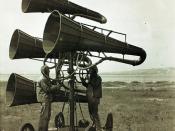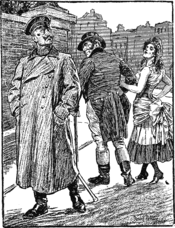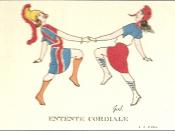Causes of World War I As each nation of Europe strived to attain the most ground in Africa, and establish themselves in the eastern trading world, imperialism emerged as a big factor in determining a country?s prestige and success. Imperialism drove each country to stretch themselves beyond the mainland of their country, and with that they had to protect their newly founded colonies as well. New technologies in the field of military, both naval and artillery left each country in a race with each other to stay ahead technologically. Because each country gained so much through imperialism and militarism, people viewed their own countries as the best, and therefore nationalistic views set the tone for conflict between nations. The cause of World War I can be asserted to the nationalistic and imperialistic views of the European nations, as well as the fast militaristic advancements.
At the turn of the 20th century, the European nations were competing against each other for the valuable trade markets of Asia, as well as land in Africa.
Each European nation, mainly Germany, France, and Great Britain, strove to obtain ?spheres of influence? throughout the world which, if placed strategically, could implement the best trade format of all the competing nations. The emergence of Germany as a nation seeking economic advances through new spheres of influence alarmed the older nations of France and Great Britain. Germany used the first Moroccan crisis of 1905 to reflect their opinions toward the other two nations. Through the Entente Cordiale, Britain allowed France to control Morocco. Germany used this agreement between the two nations as a challenge to split it apart, while in fact the German interest in Morocco only brought France and Britain closer. The competition to gain more spheres of influence and control more land was how imperialism spawned contempt between European nations.
Militarism was a huge factor in the cause of World War I. As technology rapidly advanced, and nations competed through imperialism for more land, the desire to be the most threatening nation also emerged. Each nation spent tons of money on military advancement as they struggled to keep up with the next nation?s new technology. With Germany on the rise as a new power in the European continent, the country saw its spending on military double between 1910 and 1914. As France and Britain watched the threat of Germany?s military increase, they too responded by increasing advancements in their own militaries. By 1914 nations had assembled huge armies of men, each of the main nations had at least 800,000 men in their standing armies, with Russia having about 1.2 million men. It was not the sheer volume of men that drove militarism to cause World War I; it was the outbreak of new technologies in warfare. New machine gun technology, tanks, and even aircraft changed the strategies of war for all nations. It was a new game. These advancements were aimed to increase the security of the nations they were built for, but they really did not do much besides provoke others to develop more advanced weapons. As each nation rushed to keep up with each other?s technology, relations became hostile and mistrust between them also became an issue. The hostile relations caused by the outbreak of militarism provoked countries to seek war as means of action.
The pride people had for their nations during this time period was immense. The production of factories, new technologies, new trade markets, and a more modern way of life cause many people to feel their nation was the greatest. Pride in one?s nation breeds a man ready to die for that same nation. With many men feeling their nation was so superior to others, it provided plenty of people to support the need for big armies. The successes of military advancements in different nations made the common people believe they had the best military around. This security boosted people?s spirits and they took pride in their country?s accomplishments. By having people believe that they had a great nation, it allowed the nation to become great, due to the immense support. With nationalism appearing all over Europe, clashes between nations? ideas could prove to be very dangerous. Nationalism pitted the people of each nation against each other because they all believed that their nation was the ?great one?.
The vast improvements of technology, the high spirits of citizens, and the need for countries to expand to support their population contributed to problems between nations in Europe. Militarism resulted from improvements in technology that aided the advancement of warfare, which allowed Europe to compete for security. Imperialism proved vital to each nation, if the people of the homeland were to be well supported. Nationalism resulted from the high expectations people and society placed on their own nation and its military. All of these factors led to hostility so immense in Europe that war was imminent, and the stage for World War I was set.





